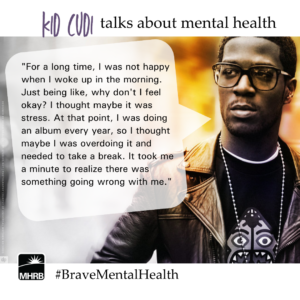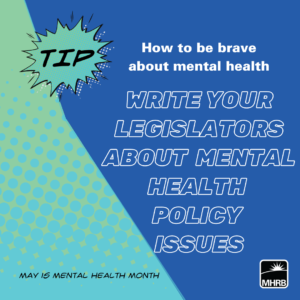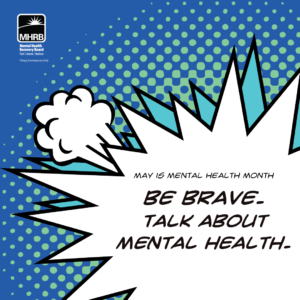Be brave. Talk about mental health.
Stigma, both from others and ourselves, remains one of the largest barriers to identifying mental health needs and seeking or accessing care. Communication research suggests that narrative and storytelling can be effective at dismantling stigma when applied to health messaging. The “Be brave. Talk about mental health.” campaign uses this concept to normalize the discussion of mental health in public and private conversations through fictional and personal storytelling.
You can download the campaign toolkit at the bottom of this page. Once you enter your information, the page will refresh. Once it does, scroll to the bottom of the page and click the link to download the toolkit.
Messaging using the #BraveMentalHealth hashtag features quotes from comic book characters, celebrity role models, and local leaders. It is designed to emphasize the following core messages:
- Talking about mental health is the first step to reducing stigma about finding mental health help for yourself and others
- If superheroes and real-life role models have mental health problems, then it is common for everyone else to have them, too
- Mental health problems don’t require superhero powers to solve. Resources and information empower people to protect their own mental health, ask for help, and advocate for more resources in their communities.
Sample social media posts
The toolkit includes five types of downloadable images, optimized for Instagram and Facebook use.
Fictional storytelling:
These posts feature superhero stories drawn from recent pop culture. Superheroes are typically “humanized” by their mental health challenges, and they can serve as fictional examples of people who feel the pressure of “presenting” well despite having problems. These posts can be used all together during the first week of the campaign or scattered throughout the month.

Role model storytelling:
These posts feature celebrities sharing their personal experiences with mental health. They are best used scattered throughout the month as real-world examples of our call-to-action. We encourage organizations to create posts that feature local leaders, influencers, or public figures talking about their own mental health.

Storytelling tips:
Even with acknowledging that mental health discourse is important, not having the right tools to navigate sensitive subjects can pose an additional barrier. These storytelling tips are designed to empower individuals to talk about mental health in an empowered, yet responsible way. The posts can either be used all together, during week one of the campaign, or scattered throughout the month.

Be brave about mental health:
These posts work best when shared consecutively with one another. We recommend using them for the last week of the campaign.

Introductory photos:
These posts work best if you choose to use weekly themes for the toolkit. If so, you can use them to introduce each series of posts (i.e., storytelling tips, how to be brave about mental health, role model storytelling, and fictional storytelling).

Other toolkit components
Press release template:
This template can be completed with local information and shared with local media. We recommend sharing it ahead of your campaign launch.
Flyers:
We encourage businesses to create welcoming spaces for open discussion of mental health for their employees. These posters offer a few tips on how to do just that.